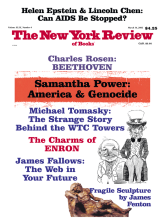To the Editors:
Any spy who happens to read The New York Review on a regular basis—who knows?—will surely have his spirits lifted by John Banville’s review of Miranda Carter’s new book about British spy Anthony Blunt [NYR, February 14]. Banville is filled with compassion for Blunt, if not for the British agents whose deaths he may have caused, and appalled by what he views as the cruel overreaction by the press and public to Blunt’s betrayal. A spy must apparently be understood and pitied, especially one who was Surveyor of the Queen’s Pictures. But what bad form it was, Banville tells us, for the Sunday Times to have headlined its report of the spy’s death with the words “Blunt the high-class spy dies in disgrace at 75.”
Did Blunt turn over secrets to the Soviet Union? Well, says Banville, “many of the so- called secrets” should have been given to the Soviet Union anyway. Do the collection of Cambridge-educated English spies (Blunt, Philby, Burgess, Maclean, etc.) deserve even a modicum of criticism for their treachery? Not really, says Banville, since “even Maclean” said he “leaked important information on America’s H-bomb project,…not in order to give the Russians a lead in the arms race, but out of the conviction that America was preparing to destroy the Soviet Union in a first-strike nuclear attack.”
Let us pause on that one. Even Maclean, as if some admission was to follow? But there is no admission at all. Like all spies, Maclean had his reasons and his excuses. Maclean’s reasons, whatever they were, led him to begin spying for the Stalinist regime well before the H-bomb was on the drawing boards. Maclean’s excuse, credited by Banville as “a not entirely improbable belief,” was that an American nuclear strike on the Soviet Union was imminent. As for Maclean’s conduct itself, Banville redefines the nature of spying itself when he refers to Maclean having “leaked” information to his Soviet spymasters. Dan Ellsberg leaked information to The New York Times; Maclean stole information and provided it to a nation dedicated to grievous harm to his own.
In the end, Banville absolves Blunt of moral culpability by minimizing his disloyalty. He did “some spying for the Soviet Union,” Banville rather casually sums up, “at a time of great danger not only to that country but to the entire world.” At the same time, Banville maximizes Blunt’s supposedly undeserved travails—not prison, not even rejection by his sponsors in Buckingham Palace, but unwanted “notoriety.”
Blunt was fortunate indeed to have escaped any state-imposed punishment. For him to now be absolved even of moral culpability for—how to put this delicately?—his perfidy is intolerable.
Floyd Abrams
New York City
John Banville replies:
My review was not aimed at exonerating Blunt—I quoted his own statement that he realized he had been “totally wrong”—but at indicating that all the evidence available suggests that what spying he did was relatively minor, and was largely confined to the war years, when the Western powers and the Soviet Union were supposedly allies.
This Issue
March 14, 2002



